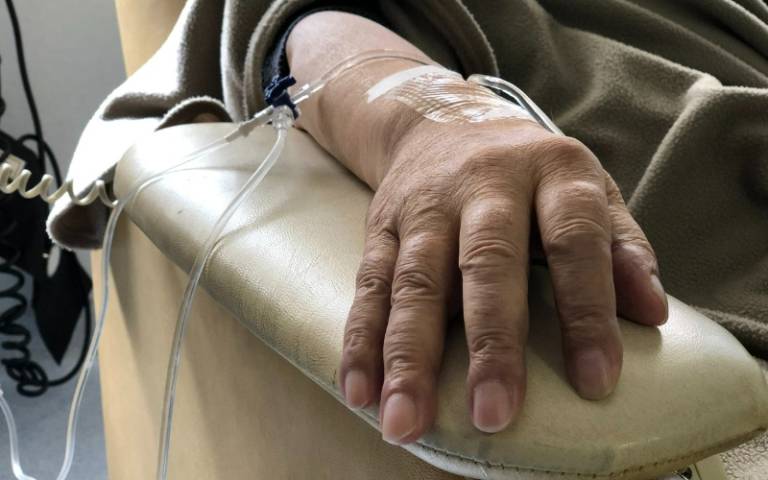Immunotherapy for ‘difficult to treat’ lung cancer patients improves long-term survival
4 July 2023
A global study, led by UCL and UCLH and sponsored by Roche, has shown that the cancer immunotherapy atezolizumab significantly improved overall survival of advanced stage non-small cell lung cancer patients who were not able to be treated with platinum-containing chemotherapy.

The trial results, published today in The Lancet, are good news for non-small cell lung cancer patients who are not eligible for standard of care platinum-based chemotherapy, due to concerns about their ability to withstand the treatment.
Lung cancer is the leading cause of cancer death worldwide, with around 2.2 million new cases and 1.8 million deaths a year. The majority of patients present with advanced stage non-small cell lung cancer (NSCLC).
For the fittest patients with advanced stage NSCLC, first-line immunotherapy with or without platinum-based doublet chemotherapy (PDC) is now established as the standard of care treatment. This follows several randomised trials that were limited to ‘fit’ participants with a median age of 65 or younger and were able to tolerate PDC.
However, more than 40% of advanced stage NSCLC patients are in poor health and are often elderly with significant medical co-morbidities. Treatment with standard PDC is not suitable for many of these patients because of poor tolerance or toxicity concerns, leaving them with limited treatment options. They are frequently treated with less effective single-agent chemotherapy or offered best supportive care.
Currently, most treatment guidelines do not recommend immunotherapy treatment due to lack of randomised results to indicate that it is safe, well tolerated and increases overall survival for this poor prognosis population.
Sponsored by Roche, this is the first reported randomised phase III trial of first-line immunotherapy treatment with atezolizumab (also known as Tecentriq) in an advanced NSCLC population deemed unfit for standard platinum-chemotherapy. The trial sought to establish the efficacy, safety and overall survival rate of first-line immunotherapy treatment with atezolizumab compared with single-agent chemotherapy in advanced stage NSCLC patients. Patients were randomised 2:1, with 302 patients receiving atezolizumab and 151 receiving single-agent chemotherapy.
The study showed that atezolizumab significantly improved overall survival and resulted in a clinically meaningful long-term survival benefit, with twice as many patients (24%) who were treated with atezolizumab remaining alive at two years compared to those treated with chemotherapy (12%), despite over 50% of chemotherapy patients who were still alive at two years receiving subsequent immunotherapy.
Professor Siow Ming Lee (UCL Cancer Institute and UCL Hospitals), who chaired the study Steering Committee and conceptualised the study design, said: “For over two decades, clinical trials have failed to provide significant therapeutic benefits to older NSCLC patients with poor health who are unfit for standard platinum doublet chemotherapy. IPSOS is the first randomised trial to show that immunotherapy treatment with first-line atezolizumab treatment significantly improves overall survival compared to single-agent chemotherapy for these poor prognosis patients, with twice as many remaining alive at two years. The treatment also resulted in stabilised or improved health-related quality of life measures, and no new safety concerns were identified.”
This trial was supported by Roche.
Links
- Research paper in The Lancet
- Professor Siow-Ming Lee's academic profile
- UCL Cancer Institute
- UCL Faculty of Medical Sciences
Image
Chemotherapy. Credit: iStock / Eric Kitayama
Media contact
Dr Matt Midgley
E: m.midgley [at] ucl.ac.uk
 Close
Close

